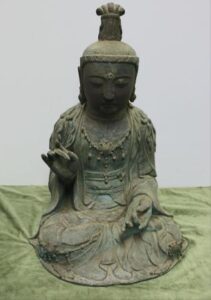
- ARAB NEWS
- 18 May 2024

SEOUL: South Korea’s Supreme Court on Thursday ruled that a Buddhist statue stolen from a Japanese temple in 2012 belongs to the temple, dismissing an appeal for ownership filed by a South Korean temple.
Ownership of the statue went to Kannonji Temple on the island of Tsushima in the southwestern Japan prefecture of Nagasaki by acquisitive prescription in 1973, the top court said, concluding that Buseok Temple in the South Korean city of Seosan lost ownership.
Buseok Temple filed the appeal after its claim of ownership was dismissed by Daejeon High Court in a reversal from a lower court ruling that recognized the South Korean temple’s ownership.

The Supreme Court, however, ruled that Buseok Temple is the same temple that created the statue in the 14th century, denying the high court’s decision that there were not enough documents to prove that they are identical.
The statue was stolen from Kannonji Temple and smuggled into South Korea by a South Korean group of thieves. The Japanese government and Kannonji have been asking for the return of the statue, a designated cultural property of Nagasaki.
The South Korean government has kept the statue as Buseok Temple claimed ownership. The temple argued that the statue had been taken away by a group of pirates, many of whom were Japanese, in the 14th century.
In April 2016, Buseok Temple filed a lawsuit against the South Korean government, claiming that the statue should be handed over to the South Korean temple.
In February this year, the high court ruled that there was a probability that the statue was taken by pirates, while rejecting Buseok Temple’s claims of ownership.
The South Korean government respects the Supreme Court’s ruling, and related organizations will make decisions to return the statue to Japan in accordance with laws and ordinances, a Foreign Ministry official said.
President Yoon Suk-yeol’s administration, working to improve relations with Japan, apparently hopes to return the statue to Japan at an early date so as not to cause a diplomatic problem.
A person linked to Buseok Temple, however, complained that the top court has legitimized robbery. The ruling is unacceptable, the person said.
The Japanese government will ask South Korea to return the statue to Kannonji Temple at an early date, Deputy Chief Cabinet Secretary Hideki Murai told a press conference in Tokyo in response to the South Korean top court’s decision.
Another statue stolen from Kaijin Shrine on Tsushima by the same South Korean group of thieves in 2012 was returned to the Japanese side in 2015, after no one in South Korea claimed ownership of the Japanese national important cultural property.
JIJI Press